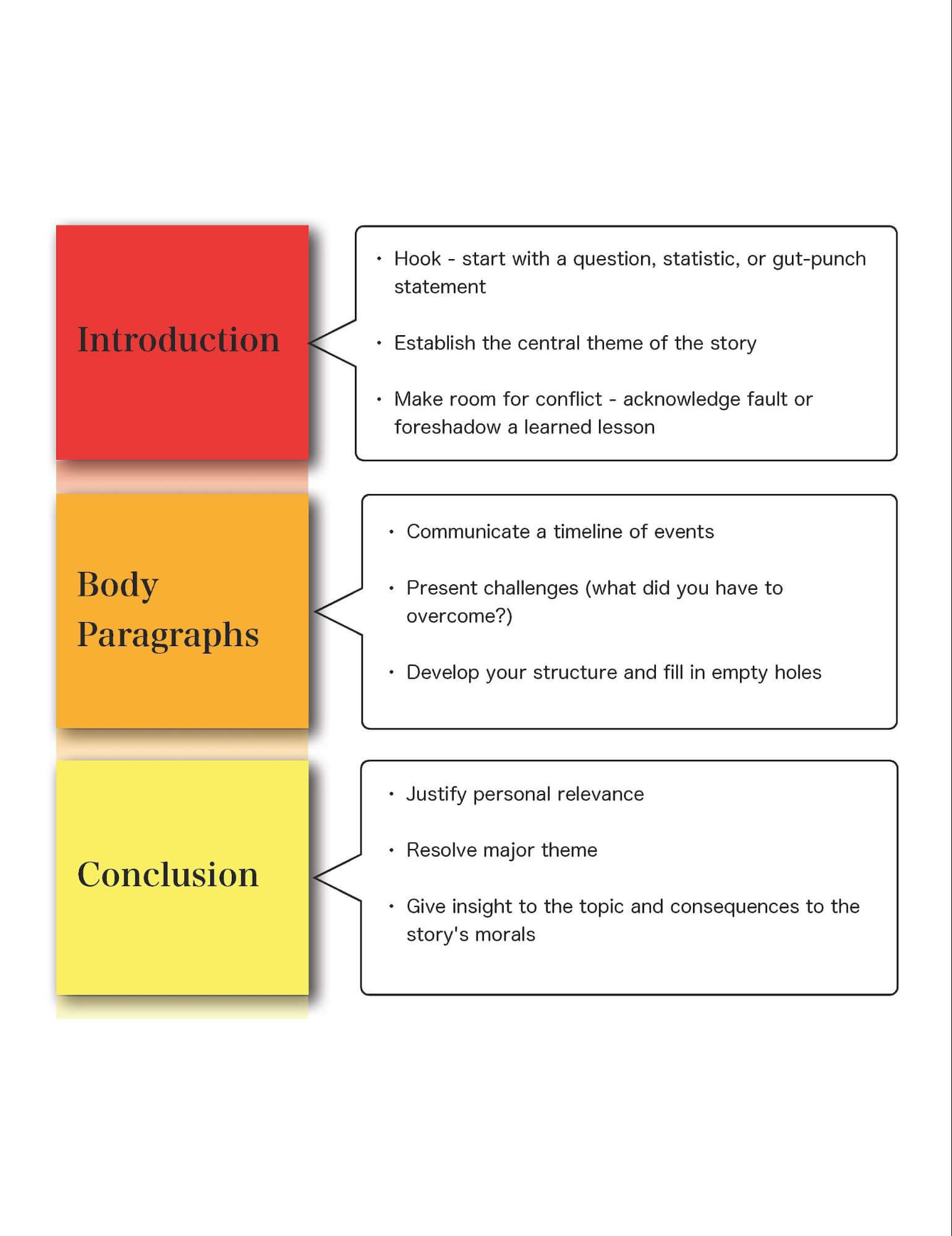I was in the Amazon jungle the first time I wrote a narrative essay, enlightened and enraptured by the influence of ayahuasca. That’s not true. I’ve never been to South America nor have I ever taken ayahuasca. The purpose of that opening is to show how to craft a narrative essay intro — hook, line, and sinker. Narrative essays rely on hooking the reader, and enticing them to read on. But what is a narrative essay? We’re going to break down everything you need to know about these essays — definition, examples, tips and tricks included. By the end, you’ll be ready to craft your own narrative essay for school or for publication.
What’s a Narrative Essay?
First, let’s define narrative essay
Narrative essays share a lot of similarities with personal essays, but whereas the former can be fictional or non-fictional, the latter are strictly non-fictional. The goal of the narrative essay is to use established storytelling techniques, like theme, conflict, and irony, in a uniquely personal way.
The responsibility of the narrative essayist is to make the reader feel connected to their story, regardless of the topic. This next video explores how writers can use structural elements and techniques to better engage their readers.
Personal Narrative Essay Examples With Essay Pro
Narrative essays rely on tried and true structure components, including:
- First-person POV
- Personal inspiration
- Focus on a central theme
By keeping these major tenets in mind, you’ll be better prepared to recognize weaknesses and strengths in your own works.
NARRATIVE ESSAY DEFINITION
What is a narrative essay?
A narrative essay is a prose-written story that’s focused on the commentary of a central theme. Narrative essays are generally written in the first-person POV, and are usually about a topic that’s personal to the writer. Everything in these essays should take place in an established timeline, with a clear beginning, middle, and end.
Famous Narrative Essay Examples
- Ticker to the Fair by David Foster Wallace
- After Life by Joan Didion
- Here is a Lesson in Creative Writing by Kurt Vonnegut
Narrative Writing Explained
How to start a narrative essay
When you go to sleep at night, what do you think of? Flying squirrels? Lost loved ones? That time you called your teacher ‘mom’? Whatever it is, that’s what you need to write about. There’s a reason those ideas and moments have stuck with you over time. Your job is to figure out why.
Once you realize what makes a moment important to you, it’s your job to make it important to the reader too. In this next video, Academy Award-nominated director J. Christian Jensen explains the power of the personal narrative.
Narrative Writing and the Personal Narrative Essay • Video by TEDx Talks
Anything and everything can be the topic of your essay. It could be as benign as a walk to school or as grandiose as a trip to the moon — so long as that narrative exists within reality. Give your thoughts and opinions on the matter too — don’t be afraid to say “this is what I think” so long as it’s supported by storytelling techniques. Remember, never limit yourself as a writer, just keep in mind that certain topics will be harder to make engaging than others.
Narrative Essay Outline
How to write a narrative essay
First step, game plan. You’re going to want to map out the story from beginning to end, then mark major story beats in your document.
Like all stories, your narrative essay needs a clear beginning, middle, and end. Each section should generally conform to a specifically outlined structure. For reference, check out the outline below.

Narrative Essay Format • How to Write a Narrative Essay Step by Step
Make sure to reference back to this outline throughout the writing process to make sure you have all your major beats covered.
Related Posts
Narrative Writing Explained
Purpose of narrative essay writing
Narrative essays give writers the ability to freely express themselves within the structure of a traditional story. Nearly all universities ask applicants to submit a narrative essay with their formal application. This is done for two reasons: they allow institutions to judge the linguistic and grammar capabilities of its applicants, as well as their raw creative side.
If you’re considering studying creative writing in an undergraduate or graduate program, then you’re going to write A LOT of narrative style essays. This process may seem indomitable; How am I supposed to write hundreds of pages about… me? But by the end, you’ll be a better writer and you’ll have a better understanding of yourself.
One thing that all successful essayists have in common is that they make radical, often defiant statements on the world at large. Think Ralph Waldo Emerson, Virginia Woolf, and Langston Hughes for example.
Being a professional essayist isn’t easy, and it’s near-impossible to be one who makes a lot of money. Many essayists work as professors, editors, and curriculum designers as well.
This next video features the late, award-winning essayist Brian Doyle. He explains all the things you need to hear when thinking about writing a story.
Narrative Essay Examples “Lecture” via Boston University
We can learn a lot from the way Doyle “opens” his stories. My favorite is how he begins with the statement, “I met the Dalai Lama once.” How can we not be interested in learning more?
This brings us all the way back to the beginning. Start with a hook, rattle off the line, then reel in the sinker. If you entice the reader, develop a personal plot, and finish with a resolute ending, you’ll have a lot of success in essay writing.
Related Posts
Up Next
Narrative Essay Topics
We've curated a collection of narrative essay topics that will spark your creativity and bring your experiences to life. Dive into the rich tapestry of your memories, explore the unique threads of your life, and let your narrative unfold.
